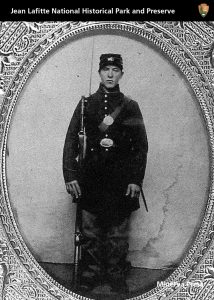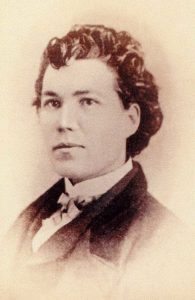By Christie Hoerneman
Historians believe at least 400 women served in the Civil War as soldiers, but documented cases are very few. One woman who served with a Michigan regiment and witnessed the Battle of Fredericksburg, Emma Edmonds, documented her time serving with Company F, the Flint Union Greys, of the Second Michigan Infantry Volunteers by writing a memoir, Unsexed; or, The Female Soldier(which was reprinted a year later as Nurse and Spy in the Union Army).
Edmonds was born as Sarah Emma Evelyn Edmonds in New Brunswick, Canada, in December of 1841. There were not many opportunities for a young woman to support herself, consequently, Edmonds dressed as a man and took the name of Franklin Thompson. With her new identity, she sold Bibles in Canada and eventually went across the border where she continued to sell Bibles in Flint, Michigan as Thompson. The Civil War broke out while Edmonds was living in Flint.
Although Edmonds was not an American citizen and had no obligation to participate in the war, she argued that she could not allow so many people to suffer while she had a comparatively easy life. In her memoir, Edmonds stated, "It is true, I was not an American—I was not obliged to remain here during this terrible strife . . . . It was not my intention, or desire, to seek my own personal ease and comfort while so much sorrow and distress filled the land." On May 17, 1861, Edmonds joined the Flint Union Greys of the Second Michigan, which was the first three-year regiment assembled in Michigan, and it was the first western regiment to reach Washington, D.C.
Edmonds served with the Second Michigan in various capacities until she contracted malaria in the spring of 1863. She had endured many injuries, which she had attended to herself in fear that a medical examination would lead the army to discover her true identity, throughout her time as a soldier. However, malaria cases were too dangerous not to be admitted into a hospital, so she was determined to desert rather than have her sex found out. She later returned to female clothing and rejoined the war as a female nurse.
Edmonds's duties as a soldier ranged from that of a male nurse to the regiment's postmaster, and finally a mail carrier. In addition to duties as a nurse, which included burying the dead soldiers, she picked up a gun and participated in the Battle of Williamsburg and the Seven Days' Battles. Edmonds witnessed some of the most infamous battles of the war, including First Bull Run, Antietam, and Fredericksburg. Edmonds recounted her experiences for later generations in her 1864 memoir. In her memoir, Edmonds described the conditions around Fredericksburg, the cold weather, the mud, and the bad roads, the Rappahannock River, and the battle.
The United States government recognized her role in the Civil War by granting her a pension of twelve dollars a month and removing the desertion charge from her record. Edmonds's wartime activities were further recognized in 1897 when the George B. McClellan Post of the Grand Army of the Republic, a premier Civil War veterans' organization, admitted Edmonds into their ranks.
Edmonds passed away when she was 58 years old on September 5, 1898. She was buried in Houston's Washington Cemetery with full military honors. In 1992, the city of Flint erected a statue outside its courthouse commending Edmonds for her wartime activities.
Sources Used for the Introduction
They Fought Like Demons is one of the definitive works on women soldiers during the Civil War. Blanton includes a lengthy literature review discussing how many historians either ignored female soldiers or would cast a negative image on them.
Nurse, and Spy in the Union Army: Edmonds' memoir relates her time with the Second Michigan Infantry as a soldier. This edition is a 1999 digital reproduction of the original work.
Other Resources about Female Soldiers Available in the Library
All the Daring of the Soldier tells the stories of women who acted as spies, as daughters of the regiments, or, disguised, as male soldiers during the Civil War, discussing why they chose nontraditional ways to help the cause and providing a portrait of the lives of women in the nineteenth century.
Hearts of Fire: Soldier Women of the Civil War: Middleton's self-published book contains lots of information about female soldiers. It includes an abundance of primary source research.
Liar, Temptress, Soldier, Spy is the never-before-told story of four real-life women who risked everything to take on a life of espionage during the Civil War.
An Uncommon Soldier is a glimpse into the life of a female soldier in the Union army through the letters of a woman who died during the war from disease. Her true identity was never known until the discovery of these letters.
On the Web

Female Soldiers in the Civil War
"The outbreak of the Civil War challenged traditional American notions of feminine submissiveness and domesticity with hundreds of examples of courage, diligence, and self-sacrifice in battle. The war was a formative moment in the early feminist movement." From American Battlefield Trust
'I Wanted to Do My Part': Women as Soldiers in Civil War America
From PBS' Mercy Street Revealed blog. Dive deeper into the series with Mercy Street's experts.
Women in the Union Armies
From the American Memory project at the Library of Congress, this Web page contains the text to a pamphlet written in support of women's suffrage that gives examples of women fighting during the Civil War.
Women Soldiers of the Civil War
The author of They Fought Like Demons: Women Soldiers in the American Civil War provides an introduction to women who served in the Confederate and Union military during the Civil War with a brief history on the topic of female soldiers as discussed by historians.
The Women Who Fought in the Civil War
"Hundreds of women concealed their identities so they could battle alongside their Union and Confederate counterparts..." From Smithsonian.com


